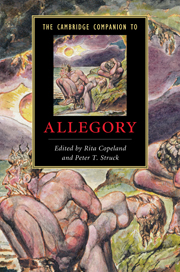Book contents
- Frontmatter
- Introduction
- Part I: Ancient foundations
- 1 Early Greek allegory
- 2 Hellenistic allegory and early imperial rhetoric
- 3 Origen as theorist of allegory: Alexandrian contexts
- Part II: Philosophy, theology, and poetry 200 to 1200
- Part III: Literary allegory: philosophy and figuration
- Part IV: The fall and rise of allegory
- Further reading
- Index
1 - Early Greek allegory
from Part I: - Ancient foundations
Published online by Cambridge University Press: 28 January 2011
- Frontmatter
- Introduction
- Part I: Ancient foundations
- 1 Early Greek allegory
- 2 Hellenistic allegory and early imperial rhetoric
- 3 Origen as theorist of allegory: Alexandrian contexts
- Part II: Philosophy, theology, and poetry 200 to 1200
- Part III: Literary allegory: philosophy and figuration
- Part IV: The fall and rise of allegory
- Further reading
- Index
Summary
Where and when the impulse to read poems allegorically emerged is impossible to say. It is surely the case that among the Greeks evidence for reading allegorically, that is, reading with the expectation that a poem's surface overlays hidden registers of meaning, is as old as any evidence we have for reading poetry. In contrast, the formalist approach that Aristotle develops, in which a reader of poetry sets out to appreciate how poems in general produce the effects they do, within parameters of genre and taking into account levels of style, modes of diction, types of plot structures and characters, and appropriate methods of moving the emotions of the audience, are a comparatively late development. Rather than try to figure out how poems in general produce their meanings, the allegorical reader sets out to find what a particular poem means. These readers exhibit an approach to poetry that sees it primarily as a repository of hidden insight.
Several ideas are not a part of this early picture of allegorical reading, and it will be useful to disambiguate them first. The idea that allegory is one trope among others, for example, a kind of extended metaphor, is a latertradition. This development, which will inform a notion of allegory that is more domesticated and functional than we find in the classical period, will await the rhetorical critics of the late Hellenistic period. Nor do we find in this earliest period an idea of allegory as a self-conscious or distinct literary procedure of composing personification fictions, in which characters are correlated to abstract ideas in a one-to-one correspondence.
- Type
- Chapter
- Information
- The Cambridge Companion to Allegory , pp. 15 - 25Publisher: Cambridge University PressPrint publication year: 2010
- 21
- Cited by

